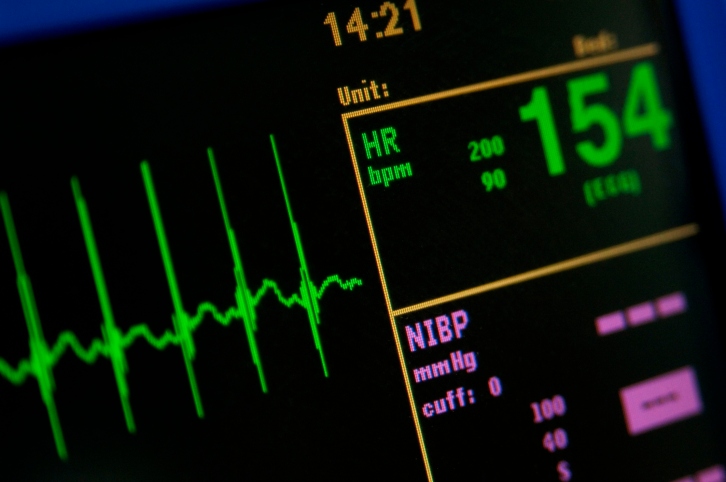
The heart is a muscle about the size of your fist. It works like a pump and beats about 100,000 times a day. It's of course vital to every aspect of life. So when something doesn't sound right with it, it's cause for alarm, right?
A heart murmur is an extra or unusual sound heard during your heartbeat. Murmurs range from very faint to very loud and sometimes sound like a whooshing or swishing noise. Normal heartbeat sounds--"lub-DUPP" or "lub-DUB"--are the sounds of valves closing as blood moves through the heart.
MUST READ: How To Spot Early Signs Of A Heart Attack
A heart murmur is not a disease; it is a sound that the doctor hears with the stethoscope. It may be normal for your child, or it could be a sign that something may be wrong. Most heart murmurs are harmless. Some are a sign of a
heart problem, especially if other signs or symptoms of a heart problem are present.
Types of Murmurs
Innocent (harmless) murmurs. A person with an innocent murmur has a normal heart and usually has no other symptoms or signs of a heart problem. Innocent murmurs are common in healthy children.
Abnormal murmurs. A person with an abnormal murmur usually has other signs or symptoms of a heart problem. Most abnormal murmurs in children are due to congenital heart disease--heart defects present at birth. In adults, abnormal murmurs are most often due to heart valve problems caused by infection, disease,
or aging.
Other Names for Heart Murmurs
Innocent heart murmurs:
-
- Normal heart murmurs
- Benign heart murmurs
- Functional heart murmurs
- Physiologic heart murmurs
- Still's murmur
- Flow murmur
Abnormal heart murmurs:
- Pathologic heart murmurs
What Causes Heart Murmurs?
Innocent Heart Murmurs
Innocent murmurs are heard when blood moves noisily through a normal heart.
Sometimes these murmurs occur when:
- Blood is flowing faster than usual through the heart and blood vessels attached to the heart
- There is an increased amount of blood flowing through the heart.
Illnesses or conditions that can cause blood to flow faster than usual
through the heart include:
- Fever
- Anemia
- Too much thyroid hormone in the body (hyperthyroidism).
Many, if not most, children will have a heart murmur heard by their doctor at some time in their lives. After childhood, the most common cause of an increased amount of blood flowing through the heart is pregnancy. Most murmurs found in pregnant women are innocent. They are due to the extra blood women's bodies make
while they are pregnant.
Innocent murmurs are sometimes due to changes to the heart resulting from heart surgery or from aging.
Abnormal Heart Murmurs
The most common cause of abnormal murmurs is congenital heart disease. Congenital heart disease occurs when the heart, heart valves, or blood vessels attached to the heart do not develop normally before a baby is born. Some babies
are born with a combination of heart defects. Common defects that cause murmurs include:
- Congenital septal defects, which are holes in the wall (septum) that separates the right and left sides of the heart. They account for more than half of abnormal murmurs in children.
- Congenital valve defects, which include narrow valves that do not allow enough blood to flow through them and leaking valves that do not close properly.
Infections and other conditions that damage heart valves or other structures
of the heart also may cause murmurs. These include:
- Rheumatic fever, a serious illness that can develop after a person has an untreated or incompletely treated infection caused by the bacteria that cause "strep" throat or scarlet fever. Rheumatic fever can lead to permanent damage to the heart. If your doctor diagnoses strep throat, be sure your child takes all of the antibiotics prescribed, even if he or she feels better before the antibiotics run out.
- Endocarditis, an inflammation of the inner lining of the heart and valves that is usually caused by a bacterial infection. Endocarditis is a serious disease that can lead to permanent heart dama
What To Do About Heart Murmurs
- Eat a heart-healthy diet with reduced amounts of saturated fat and cholesterol, and control your weight. Follow your health care provider's recommendations for treating high blood pressure,high cholesterol, or diabetes. Reduce or stop smoking.
- Have regular check-ups for your heart:
- Have your blood pressure checked every year. If you have diabetes, heart disease, kidney problems, or certain other conditions, your blood pressure may need to be monitored more closely.
- If your cholesterol level is normal, have it rechecked every 5 years. If you have diabetes, heart disease, kidney problems, or certain other conditions, your cholesterol may need to be monitored more closely.
- Moderate exercise is one of the best things you can do to keep your heart, and the rest of your body, healthy. Consult with your health care provider before beginning a new exercise program. Exercise moderately and within your capabilities, but do it regularly.








